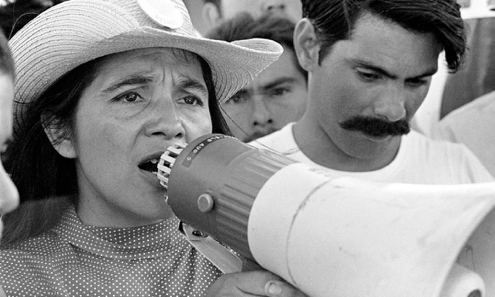Many of the great leaders and activists detailed in history books are rarely still here to share their story. When we learn about an exemplary leader in a classroom it too often means their work on earth is done, and we can only explore their life’s legacy or the great impact they made on communities through second hand stories and readings. Imagine being able to witness a living legend in action, see him or her speak.
Growing up, my grandparents proudly recounted stories from their parents’ and grandparents’ lives as Mexican-Americans in South Texas. I grew up hearing stories about my ancestors who came from humble means and worked extremely hard to provide for their families in hopes that their children would not have to experience the same hardships in life. Migrant workers are a strong part of my family’s story. These ancestors are who raised a new generation of activists, who in turn had a hand in raising me. I credit my passion for building community, civic engagement, and politics to my grandparents, my Nana and Papa. In elementary school, my Nana would take me with her to vote, talk to me about politics at the dinner table, and constantly remind me that, “no one can take away your education.” She reminds me that I am powerful simply because I am a woman, and that I can do anything a man can do and more. She reminds me of my power and privilege as an educated young woman, and never lets me forget to use it to better the world and my communities. I have been raised by a long line of unapologetically strong Latinas, so it is no surprise that I proudly look up to Latinas in history who mirror the women who shaped me into the proud Latina I am today. The name Dolores Huerta first appeared in my life as a freshman in high school and I immediately became enamored with her story and power. History books often overshadow her with the prominence of the story and work of activist Cesar Chavez. However, as an American labor leader and a successful civil rights activist, Dolores Huerta, has so much to teach us, Latina/o/x still today.1 Power is an evident theme throughout her life, be it power from within or empowering community members. I hope her story touches you the way as it has for me.
The Chicano Movement in the United States that during the 1960s brought great changes for Mexican-Americans throughout the nation. Many great activists are known in history for organizing communities, giving captivating speeches, leading peaceful protests, and ultimately enacting positive change. One of the organizations best known is the United Farm Workers Labor Union, famously connected to civil rights activist Cesar Chavez. 2 What is less known in this part of history is the story of Cesar Chavez’s community activism partner and business counterpart, Dolores Huerta. Yet, rarely do they both get the same amount of attention. This is why I am dedicated this article to a strong Latina leader and civil rights activist who has improved our lives and deserves recognition. Huerta and Chavez worked side by side, both advocating on the front lines for workers in the fields who received unfair pay and worked long hours in dangerous and harmful conditions. There are many accounts of workers being sprayed with harmful pesticides while working in the fields, and being denied water after working in the sun for hours and hours on end. With many of the workers being undocumented immigrants, the injustices that the workers faced often went unquestioned. Those who held power and owned the farms took advantage of their vulnerability and in turn denied workers basic human rights.

Huerta and Chavez did not see the oppressive and vulnerable situation of the farm workers as a weakness, but rather as an opportunity to educate and organize. Huerta and Chavez intended to fight for farm workers’ rights and took on the mission to educate and unionize them, and above all, to empower them. A movement like this had never been done before. It was considered to be extremely radical, especially for educated and accomplished leaders as themselves to be running a grassroots movement with one of the most marginalized and discriminated communities. Power is an important component to recognize, and in the movement Huerta and Chavez did not have the power of government, finances, or citizenship on their side with the farm workers. What they did. have though was the power of persuasion and power in numbers of their community. Huerta was often seen not only behind the scenes, organizing finances and paperwork for the union, but also on the front-lines protesting with signs and megaphones against the injustices in the fields. 3 This was not a common sight, especially during the 1960s to see a women as the Vice President of a large scale radical movement. Her fearlessness for the consequence of speaking out against the oppressor put her in the center of these fights for rights and remained a common theme throughout her life.

As a woman, she was rudely criticized for standing up as a clear leader in the Chicano Movement. She spent her days tirelessly organizing the United Farm Workers Labor Union in order to achieve fair pay, safer working conditions, and fewer hours. She sought respect for farm-workers in the fields often invisible and expandable. Along with her hard-working attitude she exemplified bravery and true strength. Not only was Huerta a person of color fighting the rights of farm workers, but she was a woman speaking out against social injustices in a patriarchal world. She sat at tables with men, bringing the female perspective for those who could not be present. The phrase, “Si se puede,” is one most closely identified with the movement and labor activist Cesar Chavez even though Dolores Huerta was the one to coin the three word phrase that would go on to shape and empower an entire community of people, bring strength to the oppressed, and even influence a Presidential campaign. 4 As a mother to 11 children, many would ask who cared for her children while she was out protesting and organizing, a question her male counterparts did not face. While today this would be seen as an act of bravery and strength, during this time she faced scrutiny for being in harm’s way by placing herself at the front of picket lines and being in the fields where pesticides were sprayed on workers and protesters alike. 5 While violence and hatred were used against her during this time in her life, she continued to use the power of her voice to speak for those who could not.

The Delano Grape Strike and boycott was a defining part of the Chicano Movement. The United Farm Workers Union formed picket lines and went on strike, urging consumers to stop purchasing Delano grapes and products. The goal was to disrupt business for the company, and create a space where the demands of the farm workers would be listened to and acted upon. What the farm workers lacked in financial capital was made up for in economic power gained through the boycott. In the year 1988, Huerta protested against Vice President George Bush and his opposition to the grape boycott in San Francisco, California. The protest took place outside of a hotel where Vice President Bush was hosting a $1,000-a-plate fundraiser. 6 Huerta and the other organizers made sure to keep the demonstration peaceful. Amidst the protest, police officers were instructed to clear the streets which is where things took a turn for the worst. What was intended to be a peaceful demonstration quickly turned violent when officers began to use batons against the protesters. Amidst the chaos, 58 year old Huerta was injured by a San Francisco police officer and rushed to a local hospital. She recovered fairly quickly and did not let this stop her from continuing her fight for human rights for underrepresented and minority communities.
In 2019, at the age of 89, Huerta and a group of around 500 Service Employees International Union members attended the demonstration at the Fresno County Board of Supervisors meeting to demand better pay for workers who cared for the elderly and disabled. Huerta, along with six others were arrested in Fresno, California at a labor protest. She, according to the union, it had been more than a decade since many workers had received any pay increase. “All of these supervisors make over $100,000 a year, while these people have gone without a wage increase for 11 years, and it’s time. Que es tiempo. If supervisors can’t take the heat, they should get out of the kitchen,” Huerta told reporters. 7 Being jailed at union demonstrations had been a common occurrence for Huerta as she was arrested nearly two dozen times for the same types of peaceful demonstrations throughout her lifetime. Following her arrest, Huerta said she is ready to continue protesting and hopes other community leaders will take note and follow alongside her.
Dolores Huerta is currently 90 years old and still inspiring communities to organize and speak out against social injustices that are present today. She founded the Dolores Huerta Foundation in 2003 with the mission of educating organizations on unionizing, grassroots campaigns, and the importance of educating community members on their rights. In the year 2012 President Obama bestowed Huerta with the Presidential Medal of Freedom, the highest civilian award in the United States. Upon receiving this award Dolores said, “The freedom of association means that people can come together in organization to fight for solutions to the problems they confront in their communities. The great social justice changes in our country have happened when people came together, organized, and took direct action. It is this right that sustains and nurtures our democracy today. The civil rights movement, the labor movement, the women’s movement, and the equality movement for our LGBT brothers and sisters are all manifestations of these rights. I thank President Obama for raising the importance of organizing to the highest level of merit and honor.” At the time of the award, President Obama recognized her influence in his campaign slogan, “Yes we can,” with the phrase she coined decades earlier with the Chicano Movement: “Si se puede,” She is a living reminder of these injustices that we learn about were not that far in the past, and that we must continue to challenge social norms in order to achieve a more just reality. I had no idea that learning about this inspiring, relentless, and strong woman at 14 years old would have such an impact on my life. She is my personal reminder that it is my turn, along with every other young Latina, to continue the fight for a more just reality.
- Stacey K. Sowards, Dolores Huerta, the United Farm Workers, and People Power: Rhetorical Participation in Latina/o/x Suffrage and Social Movements (Quarterly Journal of Speech 106 no. 3, 2002), 14-23. ↵
- Koo-Byoung Park, César Chávez Transformed: From Organizer of the Farm Workers Movement to the Spiritual Symbol of the Chicano Movement (Asian Journal of Latin American Studies 24 no.3, 2011), 16-26. ↵
- Dolores Huerta & Rachel Rosenbloom, As a Feminist: Dolores Huerta and Rachel Rosenbloom (Signs: Journal of Women in Culture & Society 44 no. 2, 2019), 1-6. ↵
- Maria Godoy, Dolores Huerta: The Civil Rights Icon Who Showed Farmworkers ‘Si Se Puede (National Public Radio, 2017). ↵
- Robert Gordon, Poison in the Fields: The United Farm Workers, Pesticides, and Environmental Politics (Pacific Historical Review 68 no. 1, 1999), 4-10. ↵
- Dan Morain, Police Batons Blamed as UFW Official is Badly Hurt During Bush S.F. Protest (Los Angeles Times, 1988). ↵
- Joshua Yeager & James Ward, 89-Year-Old Civil Rights Leader Dolores Huerta Arrested at California Labor Protest (USA Today, 2019). ↵



18 comments
Christopher Metta Bexar
It’s both the generation and location gap which might make me different than most readers. Though most accounts do focus on Caesar Chavez Delores Huerta is known and respected by Chicanos ( Mexican Americans from California). That is who I grew up with. I was also a child during the famous Gallo strikes.
The one point the author makes which is sadly so true is that the biggest attention has been on Cesar Chavez. Ms. Huerta should have been the President of the Farm Workers Union. She did more for it than Cesar Chavez. I first heard about her in detail from ny Chicano Studies professor when I received my first undergraduate degree in Los Angeles. He was the son of field workers.
Christopher Metta Bexar
It’s both the generation and location gap which might make me different than most readers. Though most accounts do focus on Caesar Chavez Delores Huerta is known and respected by Chicanos ( Mexican Americans from California). That is who I grew up with. I was also a child during the famous Gallo strikes.
The one point the author makes which is sadly so true is that the biggest attention has been on Cesar Chavez. Ms. Huerta should have been the President of the Farm Workers Union. She did more for it than Cesar Chavez. I first heard about her in detail from ny Chicano Studies professor when I received my first undergraduate degree in Los Angeles. He was the son of field workers.
Madeline Chandler
This was such an amazing article about the importance of women and voices raised by the Hispanic culture. I did not know this aspect of the workers rights protests in California. Her strength and leadership in culture is truly inspiring. I had no idea that Delores Huerta worked along side of Cesar Chavez, I wish growing up that we learned more about her.
Danielle Slaughter
Hey, Allison.
Having grown up in and around the San Antonio area, with Cesar Chavez Boulevard and the marching taking place every year (under normal circumstances), I’d obviously heard his name more often mentioned in the context of Latinx history. I hadn’t learned of Dolores Huerta until I got to college, but I wish I had sooner. What an icon — a powerful Latina woman, leading her people in their advocacy. Stories like hers remind me that even in a supposedly advanced nation like the United States, minority groups still need empowerment, and they still need leaders like Dolores Huerta.
Camryn Blackmon
Hi Allison,
I love that you were able to bring attention and truth to Delores Huetra’s story. I knew of her name, but to be honest, I definitely had learned more about Ceasar Chavez throughout my life. It is so significant that you talk about her important contributions to the movement and compare the inequalities of both of these human rights activists and leaders. I like that you are telling her story and asking the readers to understand why we didn’t know more about her before.
Genesis Vera
This article was so inspiring and well thought out. I can tell that the writer focused on the small details and I’m glad because those small details made this story so well rounded. I loved the images that were used because it captured the protagonist in her essence and you can feel that. This article was powerful and I’m happy I got to read it.
Manuel Rodriguez
Allison, thank you for taking the time to write about a significant figure in history who continues to work towards a more equitable society today. You know, I recently learned about her impact as a workers rights activist in California along side Cesar Chavez. Her presence not only as a woman, but as a Latina at the time was powerful and thanks to her and negotiation skills America has accomplished the strides it has made so far and you managed to illustrate that in your article. I hope she continues to be a strong activist and a voice of reason for as long as she can. Great job!
Kayla Sultemeier
Excellent article, Allie! I loved this read. As a Hispanic woman, I find it truly disheartening that this is my first time hearing about Delores Huerta. She is so inspirational, and I love the persona and power that she exudes for you, me, and the rest of the Hispanic women who shoot for the stars in their everyday lives. I have always heard the endearing phrase “Si se puede,” but I never knew where the term was coined. I hope to see more trailblazers like Delores Huerta in my life; they make me extremely proud of the community that I grew up in.
Yaniev Ibarra
I absolutely love this article! Dolores Huerta has always been one of my favorite activist and leader, she is indeed a legend. A great woman who is monumental for the improvements of farm workers labor, socially and economically and an inspiring civil rights activist. It took a lot of courage and effort to stand up for the injustices she did, and always with the intent to keep it peaceful. Dolores Huerta is a brave and outstanding woman so much to be recognized for the highest civilian award in the United States. Great work with this article!
Lindsey Ogle
This was such a great article! I had never herd of Dolores Huerta until reading this article. It was great to read about how she stood up for what she believed in to make change in the world. I have heard of Cesar Chavez but its crazy to think she worked with him but never got the recognition that he did. This was a very well-written article.